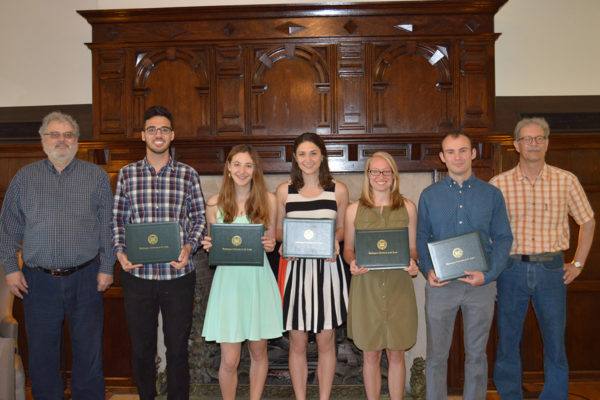Students receive renewable energy certificate
Seven Washington University in St. Louis students successfully completed the Certificate in Renewable Energy and the Environment this year, the largest group to date.
Obituary: Maggie Ryan, 2016 graduate, 22
Maggie Ryan, 22, died in a car accident Sunday, May 22, 2016, in Wayne County, Ind., on her way home to Boston, just two days after earning degrees in anthropology and in women, gender and sexuality studies from Washington University in St. Louis. Ryan was deeply committed to helping the Washington University community, serving as a leader of both Dance Marathon and Alpha Phi Omega service fraternity.
Wysession receives award for geosciences education
Michael Wysession, professor of earth and planetary sciences in Arts & Sciences, has been recognized for his exceptional leadership in geosciences education by the Seismological Society of America with the 2016 Frank Press Public Service Award.
Terschluse selected for Grossman-Alexander Prize
Jack Terschluse, who just earned a bachelor’s degree in political science in Arts & Sciences, received the university’s Grossman-Alexander Prize. The competitive award is presented each year to an outstanding graduating senior with an emphasis on American politics.
Powells commit $8 million to professorships in chemistry
Mike and Tana Powell, who have been actively engaged at Washington University in St. Louis since their daughter Landis enrolled in the Arts & Sciences Class of 2016, have committed $8 million to match gifts for endowed professorships in the Department of Chemistry and other critical disciplines.
Driving Discovery: Launching a new era of scientific research
A new era of scientific discovery is being launched at Washington University in St. Louis that will transform teaching, research, faculty and facilities in Arts & Sciences. Driving Discovery is an ambitious multiphase project in Arts & Sciences that will create new research and teaching facilities for the sciences.
Graduate student Ashley Macrander’s message to graduates
The text of the Commencement speech by graduate student Ashley Macrander, who earned a doctorate in education. 2016 marked the first time a graduate student gave a speech at the universitywide Commencement.
Obituary: Robert Morrell, professor emeritus, 86
Robert E. Morrell, a professor emeritus who taught Japanese literature and Buddhism at Washington University in St. Louis for 34 years, died May 11, 2016, in St. Louis after a brief illness. He was 86.
Barch, Ley, Boime to be honored
Deanna Barch, a leading researcher on the role of cognition, emotion and brain function in illnesses such as schizophrenia and depression; Irving Boime, a developmental biologist; and Timothy Ley, MD, an expert in cancer genomics and leukemia, will be honored by Washington University in St. Louis, Chancellor Mark S. Wrighton has announced.
Anthropology student Walsh Lang honored for HIV work in Uganda
Colleen Walsh Lang, a graduate student in sociocultural anthropology in Arts & Sciences, has been selected to receive the HIVMA student award in recognition of her research on HIV-infected children in Uganda.
View More Stories







